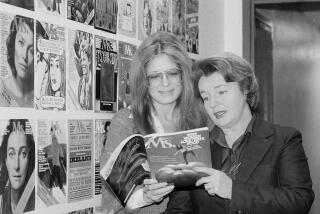Book Review : The Folly of an Old British Misogynist
- Share via
Difficulties With Girls by Kingsley Amis (Summit Books: $18.95; 276 pages)
Though brand-new, this is vintage Amis, not only set in 1960s England, but with all the attitudes, prejudices and confusions of that era intact and unmitigated by events of the last two decades. Unlike his most recent novel, “The Old Devils,” which treated the reunion of old acquaintances with compassion as well as humor, “Difficulties With Girls” scraps the sympathy and bears down on the wit. Here, Amis has reverted to an earlier and somewhat less lovable self, demonstrating that the angry mannerisms of an angry young iconoclast can be somewhat less endearing in a mature gentleman of 66.
Like “Lucky Jim,” Amis’ new hero, Patrick Standish, wallows in pride, lust, anger, sloth, greed, covetousness and envy, but somehow he doesn’t seem to be having nearly as much fun as Jim Dixon did back in 1954, when sheer caddishness was refreshingly entertaining. Time has marched on, leaving the plot and point of view behind. Even popular taste in the seven deadly sins has changed. Lust, vanity and greed have had their day. Sloth, the least dangerous of the lot, may be all that’s left for the ‘90s.
Standish, still tomcatting around London in the swinging ‘60s, has no way of seeing into the present or future. The sexual revolution is in full flower, and lechery is considered an upper-class sport, like riding to hounds. His unreconstructed bigotry regarding any person less indisputably English than Alfred the Great is less ingratiating. Standish is contemptuous of every other ethnic and religious strain, handing out slurs right and left. He’s particularly splenetic about women, who aren’t technically even a minority.
Because the plot depends so heavily upon the uncertain sexual orientation of one of the main characters, much of the ostensible fun is had at the expense of homosexuals, who are treated in a way no longer regarded as hilarious, let alone responsible or accurate.
Here’s Standish recovering his sang-froid after learning that his employer is not a Jew in disguise but the nephew of an Anglican bishop. “He was really so far from being anti-Semitic that a couple of his best friends really were Jews, and if he lived to be a hundred he would never forget the marvelous piece of luck he had once had at a bar mitzvah in Two Waters. And now, trying to do no more than raise a not very creditable laugh, he had ended up one down from an old shag on whose real anti-Semitism any punter would have plunged. Not possible in a just world.”
Though that explanation doesn’t help matters as much as the author might have wished, it does make a splendid show of form, style and content.
Standish and his wife live in a new block of flats in a newly gentrified London neighborhood. One day a befuddled chap calling himself Tim Valentine rings their doorbell inquiring about vacancies. Almost at once he informs the Standishes that he’s decided he’s homosexual and wants to verify the theory. Standish introduces him to Eric and Stevie, who are more than willing to help Valentine find his true self. Eric and Stevie are caricatures too overdrawn even to be a “part of a turn at a men’s club in the north of England” (a modest authorly observation that doesn’t stop Amis from exploiting the situation for more than it’s worth).
The misadventures of this trip provide the subplot; the plot proper derived from Standish’s clumsy seductions and attendant deceptions; frayed material reinforced by wicked sendups of elderly Irish women novelists, young avant-garde poets, Welsh historians, mercenary publishers, predatory agents and other stock types from the world of belles lettres. No one gets home free in this misogynistic diversion except Standish himself, and he deserves his good luck least of all.
More to Read
Sign up for our Book Club newsletter
Get the latest news, events and more from the Los Angeles Times Book Club, and help us get L.A. reading and talking.
You may occasionally receive promotional content from the Los Angeles Times.










